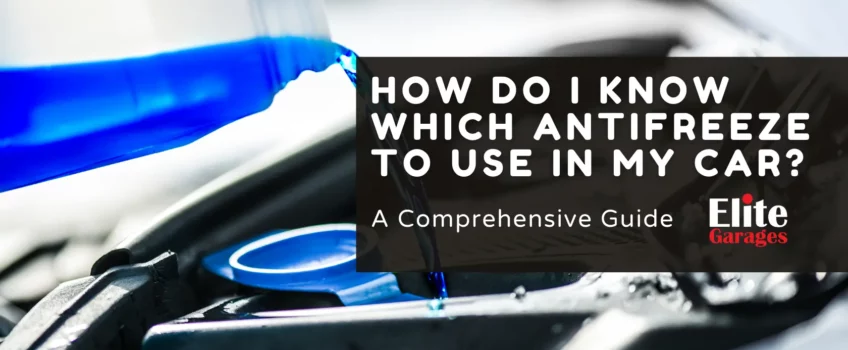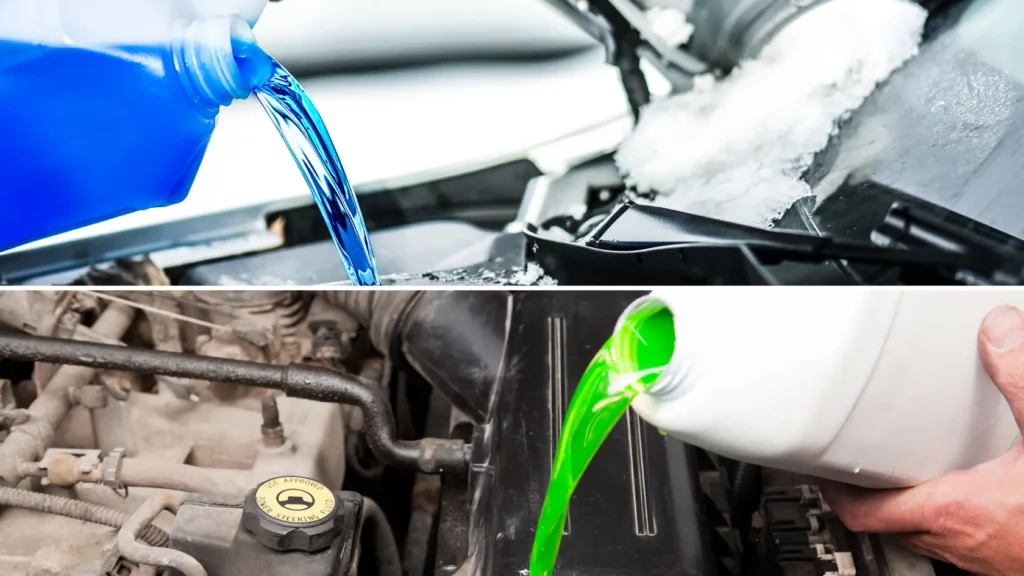
Does It Matter What Antifreeze I Put In My Car?
Every part of our car requires specific care, and one of those key elements that often gets overlooked is antifreeze. Whether you’re a seasoned motorist or a car newbie, understanding the importance and specifics of antifreeze is crucial. This comprehensive guide contains some valuable insights into antifreeze and why it’s important to choose the right one for your car.
Every car enthusiast knows the thrill of a smooth drive, the hum of an engine in perfect harmony, and the sheer joy of motoring. But beneath that thrilling experience lies the science and that keeps our beloved vehicles running optimally. One such unsung hero is antifreeze. If you’ve ever wondered about the colourful liquids that play a pivotal role in your car’s performance, or if you’re simply curious about ensuring your vehicle gets the best care, then you’re in the right place.
So, What Exactly is Antifreeze?
Antifreeze, sometimes referred to as coolant, is a vital fluid for an engine’s well-being. It’s formulated to ensure that the engine operates within a safe temperature range, regardless of environmental conditions. Here’s a breakdown of what antifreeze is and why it’s so crucial:
- Preventing Freezing: As its name suggests, antifreeze helps to ensure that the water in your engine doesn’t freeze during those frosty UK winters.
- Raising the Boiling Point: This comes handy during summer months when the engine is at risk of overheating.
- Reducing Corrosion: Antifreeze helps in maintaining the health of your engine by reducing the chances of corrosion.
- Lubrication: Apart from its primary cooling function, antifreeze also contains lubricants that help in the smooth operation of the water pump and other components of the cooling system.
The Colourful World of Antifreeze: What Do They Mean?

Contrary to popular belief, antifreeze doesn’t come in a ‘one size fits all’. It’s specific to vehicles and often characterised by its colour. Here’s a simple breakdown of the different colour antifreeze:
- IAT (Inorganic Additive Technology): Green and best antifreeze for older model cars (pre-1998).
- OAT (Organic Acid Technology): Orange and often used in General Motors, Saab & Volkswagen.
- HOAT (Hybrid OAT): Yellow, commonly found in Ford, Chrysler & other European models.
- HOAT Phosphate Free: Turquoise, tailored for BMW, Volvo, Tesla, & Mini.
- P-HOAT (Phosphated HOAT): Can be pink or blue, used mainly in vehicles such as Toyota, Nissan, Honda, Hyundai, KIA.
- Si-OAT (Silicate HOAT): Purple antifreeze, often in luxury brands like Mercedes-Benz, Audi & Porsche.
Pro Tip: Always refer to your vehicle’s manual. The colour might give you a clue, but the manual will provide specifics. Remember, using the wrong antifreeze can have harmful consequences for your engine.
The Risks of Choosing the Wrong Antifreeze
Choosing the right antifreeze for your vehicle is not just a matter of ticking off a maintenance checklist. It’s about ensuring the longevity and optimal performance of your engine. As mentioned earlier, choosing the wrong type can have a range of harmful effects. Let’s delve deeper into the potential risks:
Engine Damage:
- Chemical Reactions: Mixing incompatible antifreeze can lead to harmful chemical reactions. These can result in the formation of sludge or gel-like substances that obstruct antifreeze flow.
- Temperature Extremes: The wrong type can also compromise the boiling and freezing points, potentially leading to overheating in summer or freezing in winter.
- Wear and Tear: Incompatibility can accelerate wear and tear in the engine, leading to premature component failures.
Reduced Efficiency:
- Performance Dips: The engine might not achieve its peak performance if burdened with the wrong antifreeze. This could lead to reduced horsepower or an uneven idle.
- Fuel Inefficiency: An engine running too hot due to incorrect antifreeze can burn fuel less efficiently, leading to increased consumption and expenses.
Recommended: Driving Habits That Impact Fuel Consumption And Driver Safety
Increased Corrosion:
- Chemical Breakdown: Some antifreeze types might not offer the protection your engine metals require, leading to the breakdown of the coolant and eventual corrosion.
- Component Erosion: Wrong antifreeze might not lubricate the water pump and other components effectively, leading to increased wear and a shortened lifespan.
Costly Repairs:
- Unanticipated Breakdowns: The wrong antifreeze can cause unexpected engine breakdowns, leading to inconvenient situations and potential towing costs.
- Component Replacements: Continuous use of inappropriate antifreeze can result in the need to replace corroded or damaged parts sooner than anticipated.
Environmental Concerns:
- Waste: Frequent replacements or flushes due to the use of incompatible antifreeze can lead to more waste, which isn’t environmentally friendly.
- Toxicity: Incorrectly disposed antifreeze can pose threats to the environment. It’s essential to ensure you’re not just replacing it frequently but also disposing of antifreeze responsibly.
Staying on Top of Vehicle Maintenance
Beyond just the antifreeze, regular checks and maintenance are essential. From wheel alignments to battery checks, ensuring every part of your vehicle is in top shape will prolong its lifespan and save you money in the long run.
Whether you’re a car enthusiast or simply happy to get from A to B, the tips above can help keep your vehicle in optimum condition. With that being said, here are a few additional pointers to keep in mind:
- Have an experienced technician check the antifreeze concentration and coolant levels regularly.
- Ensure all filters (fuel, air & oil) are changed as per the manufacturer’s guidelines.
- Follow a strict maintenance schedule and use only recommended oils and lubricants specified by your vehicle’s manufacturer.
- Keep a check on tyre tread depth to ensure safety on wet roads or snow.
- When in doubt, don’t hesitate to refer to your owner manual for guidance.
It might seem like a lot of effort, but maintaining your car is more than worth it. Keep these tips in mind and you’ll keep your vehicle running smoothly for miles and miles to come!
Recommended: Why Are Annual Car Services Important?
Conclusion: Get it Right with Elite Garages
Choosing the right antifreeze for your car might seem daunting, but it doesn’t have to be. At Elite Garages, we’re here to help. Visit our website to learn more about our services and how we can assist in ensuring your car is using the right antifreeze. Book your service today and drive with peace of mind!
FAQS: Antifreeze
Click the + to read any of the answers about antifreeze or visit our most FAQ page to review the most frequently asked questions across all our Elite Locations.
If you click on a ‘Category’ or ‘Tag’ link, the page will ‘refresh’ and reload the page showing the top of the page first, you’ll then just need to scroll down to the FAQ section to see the results for the Category or Tag you selected.
The type of coolant you use should be compatible with your vehicle’s engine requirements. Using the wrong antifreeze can lead to engine damage, reduced efficiency, increased corrosion, and potentially costly repairs. Always consult your vehicle’s manual or manufacturer’s recommendations to ensure you select the appropriate antifreeze for your car.
In essence, yes. Antifreeze becomes coolant when mixed with water. However, it’s worth noting that you should always use distilled water to ensure there are no contaminants.
In a pinch, yes, you can. But it’s not recommended as a long-term solution. Pure water can lead to corrosion and won’t offer protection against freezing or overheating.
About Us
Opening Times
Saturday : 8:30–4:00
Sunday : closed
More Information
Contact UsCustomer Information Pack
Check MOT Due Date
Free MOT reminder
Careers


